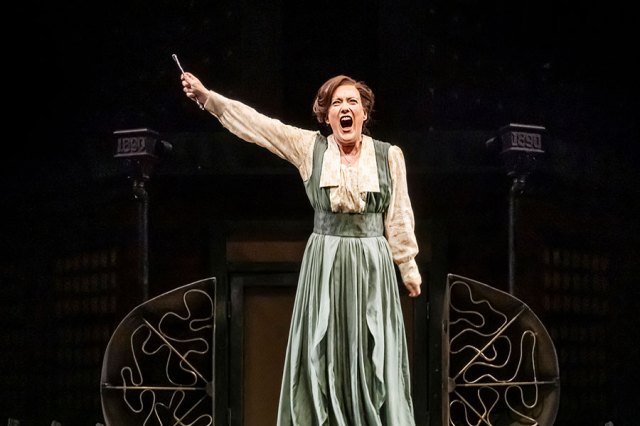My Fair Lady review – new revival is as loverly as it gets
James Brining directs the new staging of Lerner and Loewe’s classic at Leeds Playhouse

Returning from the interval after a fine first half marked by an outstanding Henry Higgins, a feistier-than-unusual Eliza Doolittle and terrific work from chorus and orchestra (it must be a boon having Opera North on your doorstep), we are confronted by sleeping housemaids. Then, all of a sudden, Higgins and Colonel Pickering burst in, drunk, from the ambassador’s ball.
It’s this scene that takes My Fair Lady at Leeds Playhouse to another level. Higgins, so wildly elated, and even normally gentlemanly Pickering (after all, he starts the song, “You Did It”) caper and rejoice as Eliza sits morose in her chair; in a telling touch, the servants get a glass of champagne, but nobody thinks of Eliza. Her plaintive lament, “But what’s to become of me?”, her reprise of “Just You Wait” and, in the next scene, her heartfelt delivery of “Show Me” reveal that this tinker-free production is a My Fair Lady for the 2020s. And what of the ending? This Eliza can’t possibly go back to Higgins, so the final scene shows Higgins at his recording machine listening to Eliza, then she appears at a distance in her rags. The perfectly-pitched implication is clear: the closing moments are all in Henry’s mind!
Leeds Playhouse and Opera North have merged their talents before, most recently in A Little Night Music, and this is another resounding success. James Brining of the Playhouse brings his stage and an intelligent, unsentimental directorial hand to the party. Opera North provides a 50-piece orchestra, dynamically directed by Oliver Rundell, and chorus members to operate as chorus and also take most of the main parts. All that is needed is to add in three guest principals and economical and attractive designs from Madeleine Boyd (also a veteran of A Little Night Music).
One of the guests, John Hopkins, as Higgins, nails the audience instantly with “Why Can’t the English?”, his irritation and his contempt for lesser mortals – including females, his mother excepted – one step up from the norm. And he is funny, never more so than when dressing himself in a hurry after Eliza’s departure. At the end, his wallowing in (no doubt temporary) self-indulgence feels well-earned.
Katie Bird is furiously cockney at the beginning, exploiting the pathos of “Wouldn’t It Be Loverly?” and reacting with more genuine offence and fewer of those squawks to Higgins’ offensive behaviour. After disgracing herself at Ascot (a witty piece of design, with chorus members’ heads popping out from elegant drawings while they remain dressed and hidden as the common folk) Bird’s performance, always beautifully sung, gains added weight and credibility.
Katie Bird (Eliza Doolittle) in My Fair Lady © Pamela RaithRichard Mosley-Evans’ Doolittle could perhaps have done with a touch more Welsh cunning, but his gloriously disreputable manner and his breezy attack on his two songs come across with suitable relish. Dean Robinson, in keeping with Brining’s take on the show, refrains from caricature as Pickering (except for a telephone chat with Boofy at the Home Office), instead emerging as a confirmed bachelor, like Higgins, but a kindly gentleman.
Ahmed Hamad’s Freddy does nicely by “On the Street Where You Live” and is generally silly enough to inspire Higgins’ incredulous “Marry Freddy?” and decent enough to make it a real possibility.
Of course, with Opera North to hand, you expect (and get) high standards musically, but there’s no shortage of acting ability on view (Helen Evora as Mrs Pearce and Miranda Bevin as Mrs Higgins, for instance) and some pretty nifty movement. Maybe you don’t get cartwheels and suchlike, but Brining fills the chorus scenes with jolly and meaningful action.















































